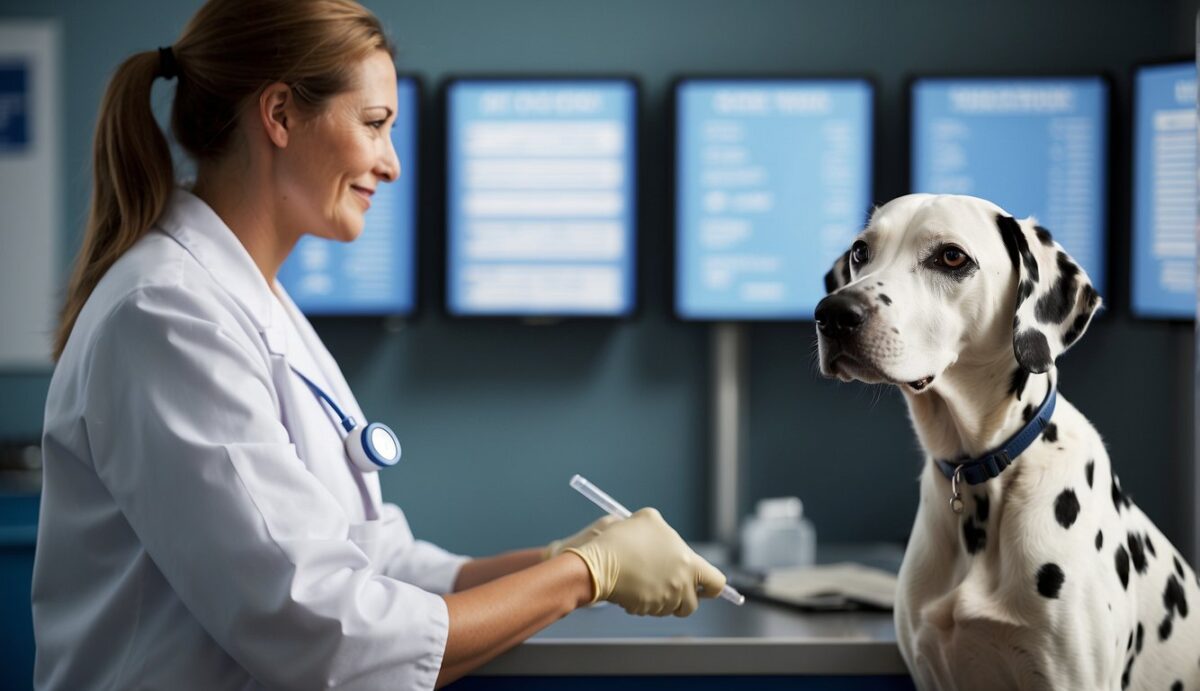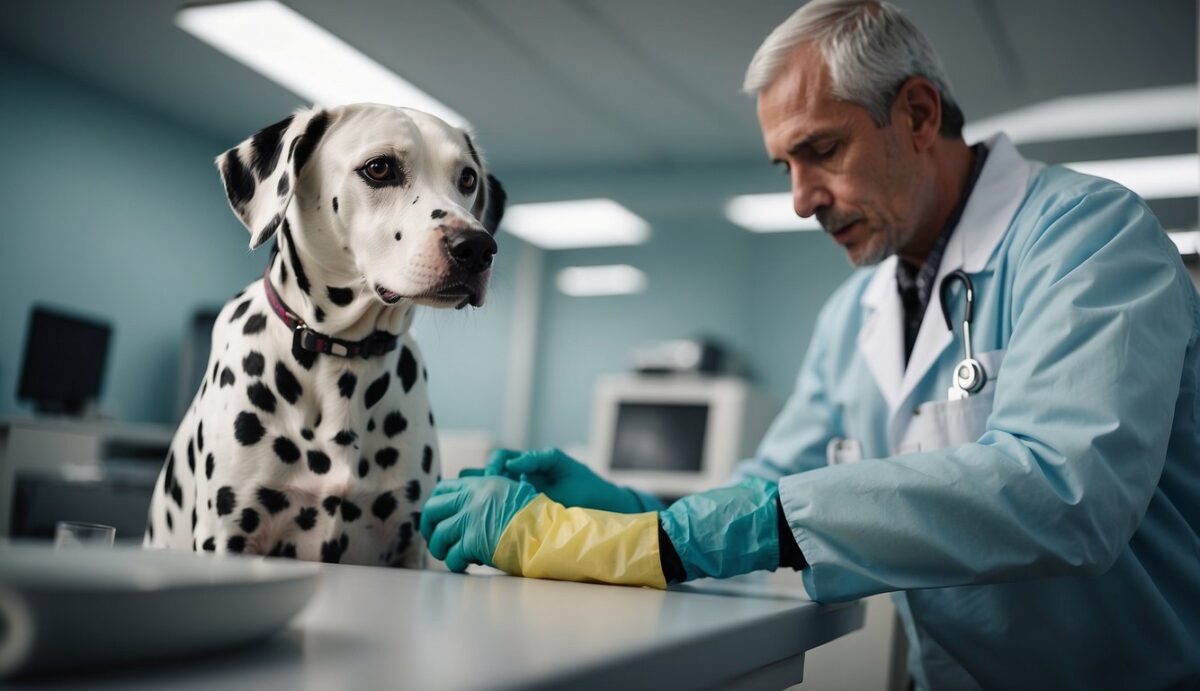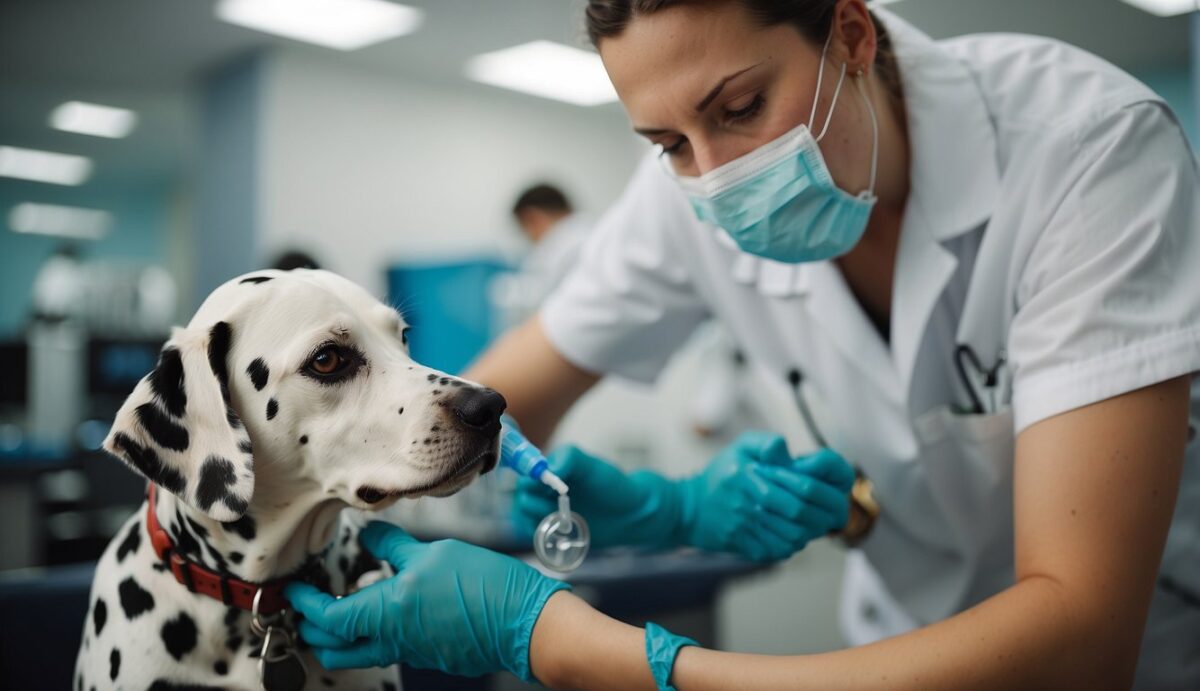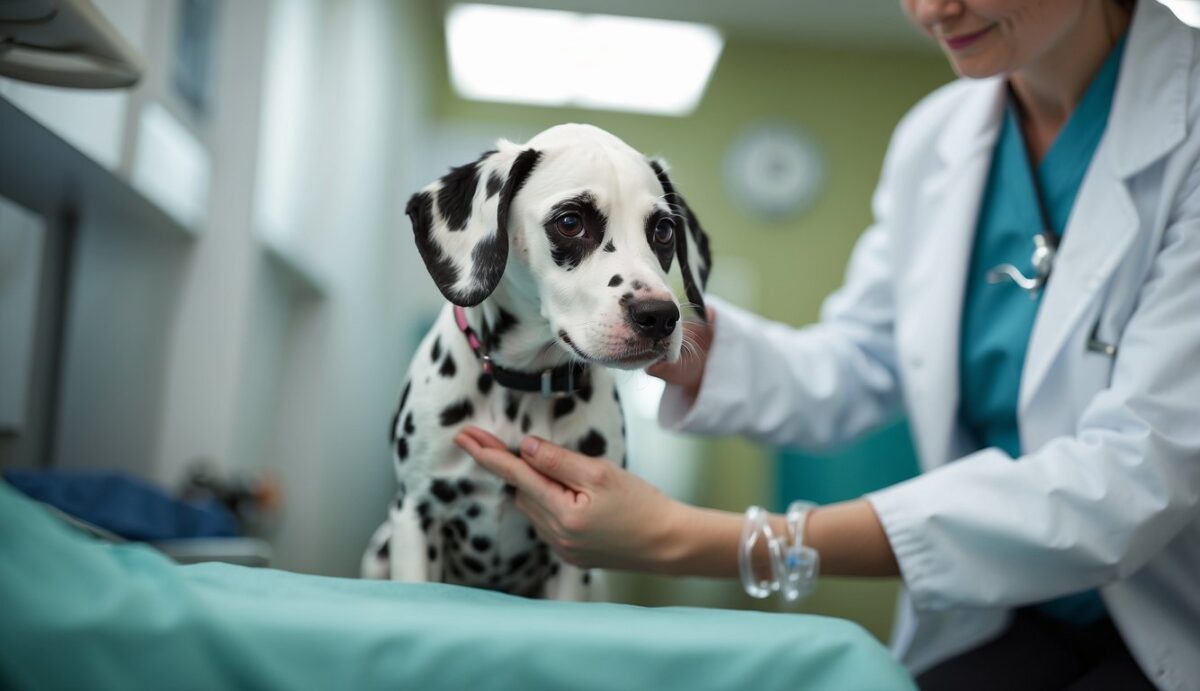Maintaining the health of your Dalmatian includes a comprehensive vaccination strategy to protect them against various diseases.
Your vet plays a crucial role in determining the most suitable vaccination schedule for your Dalmatian. They take into account your dog’s specific health needs, lifestyle, and risk factors.
Vaccinations are essential for your dog’s well-being and are a proactive step to prevent disease outbreaks that can have severe consequences for both individual dogs and broader canine communities.
As a responsible pet owner, it is important to understand why vaccinations are necessary for your Dalmatian.
Vaccines work by preparing your dog’s immune system to recognize and combat harmful pathogens without causing the disease.
This means that when vaccinated, your Dalmatian’s chances of becoming seriously ill are vastly reduced.
The recommended vaccination schedule, often advised by your vet, is designed to provide immunity at key stages of your dog’s life, ensuring they are protected when they’re most vulnerable.
Key Takeaways
- Vaccines are a key part of your Dalmatian’s health regimen and are designed to combat various diseases.
- Your vet is essential in creating a vaccination schedule tailored to your dog’s unique needs.
- Understanding the balance between vaccine efficacy and safety helps in managing your pet’s health and preventing disease outbreaks.
Understanding Vaccinations

In your journey as a Dalmatian owner, keeping your beloved dog healthy is a top priority.
Vaccinations play a crucial role in preventing various infectious diseases that can affect your dog’s well-being.
Let’s explore how vaccines safeguard your Dalmatian’s health.
The Role of Vaccines in Dog Health
Vaccination, a key component in veterinary care, arms your dog’s immune system against highly contagious and potentially deadly diseases.
Regular vaccinations help maintain your pet’s health and prevent the spread of infectious diseases to other animals and, in some cases, humans.
- Core Vaccines: Crucial for all dogs
- Canine distemper
- Canine parvovirus
- Canine adenovirus (hepatitis)
- Rabies
Core vs. Noncore Vaccines
The vaccines your Dalmatian requires fall into two categories:
- Core vaccines are essential for all dogs, as they protect against diseases that are more severe or widespread.
- Noncore vaccines are given based on your dog’s lifestyle and risk factors.
- Bordetella bronchiseptica (kennel cough)
- Leptospira spp. (leptospirosis)
- Borrelia burgdorferi (Lyme disease)
- Canine influenza virus
How Vaccines Work
Vaccines mimic infections to stimulate your dog’s immune system without causing the actual disease.
This safe exposure helps your dog develop immunity, enabling their body to fight off the virus or bacteria if encountered in the future.
Common Canine Diseases Prevented by Vaccination
By sticking to the recommended vaccination schedule, you’re protecting your Dalmatian from several harmful pathogens:
- Rabies: A fatal virus that can spread to humans.
- Distemper: A virus that can cause severe respiratory and neurological symptoms.
- Parvovirus: Highly contagious virus leading to life-threatening gastrointestinal issues.
- Adenovirus: Responsible for hepatitis.
- Leptospirosis, Lyme disease, and Bordetella: Bacterial infections that can affect various body systems.
Vaccination and Public Health
Your Dalmatian’s vaccinations are not just about their health; they also protect public health by controlling diseases like rabies and leptospirosis. These are zoonotic diseases that can be transmitted from animals to humans.
Recommended Vaccination Schedule

Protecting your Dalmatian’s health is vital, and vaccinations play a crucial role. A schedule tailored to your dog’s life stage and lifestyle is key.
Puppy Vaccination Timeline
When you bring home a Dalmatian puppy, their vaccination schedule kicks off as early as 6 weeks old.
Expect to visit the vet for shots against parvovirus, distemper, adenovirus, and influenza.
The core vaccine timeline:
- 6-8 weeks: First doses of core vaccines.
- 12 weeks: First rabies vaccine, as required by law.
- 16 weeks: Final round of puppy vaccines.
Remember, these vaccines will come in a series to ensure your puppy’s immune system gets the protection it needs.
Adult Dog Vaccination Plan
As your Dalmatian grows, maintain their health with adult vaccinations. Here’s a basic plan:
- 1 year: Booster shots for distemper, parvo, and adenovirus.
- 1-3 years: Rabies booster as per legal requirements.
- Every 1-3 years: Booster shots for core vaccines, depending on vaccine efficacy and vet’s recommendation.
Consult your vet to personalize the schedule based on your dog’s exposure risk.
Senior Dog Considerations
Senior dogs might have different health considerations. Their immune system might not be as robust, so discuss with your vet whether you should continue, adjust, or skip certain vaccinations.
Factors Affecting Vaccination Timing
Your Dalmatian’s lifestyle, including frequent visits to dog parks, geographic location, and overall health, can influence their vaccination timing.
For instance, dogs exposed to more risks may require more frequent booster shots.
Understanding Booster Shots
Booster shots are follow-up vaccinations given after the initial series to maintain vaccine efficacy over your Dalmatian’s lifetime.
They aren’t just repeats; they’re crucial for ongoing protection.
Legal Requirements and Rabies
Rabies vaccination is legally required for dogs in many areas due to public health concerns.
The law often dictates the timing of the rabies vaccine, usually around 12 weeks for the initial dose and boosters every 1-3 years.
Always adhere to vaccination laws to ensure both public safety and your dog’s health.
Vaccine Efficacy and Safety
Your Dalmatian’s health and protection against disease heavily depend on vaccinations. Understanding vaccine efficacy and safety ensures your pet receives the best care.

Evaluating Vaccine Effectiveness
Vaccine efficacy refers to the degree to which a vaccine prevents disease under controlled conditions, typically in clinical trials.
Effectiveness, however, measures how well the vaccine performs in the real world.
For your Dalmatian, the vaccines are rigorously tested to provide optimal protection against specific diseases.
Common Side Effects and Risks
Like all medical interventions, vaccines can cause side effects. These are generally minor, such as:
- Soreness at the injection site
- Mild fever
- Lethargy
Serious adverse reactions are rare but require immediate veterinary care.
Handling Adverse Reactions
Should your Dalmatian exhibit a reaction to a vaccine, it’s crucial to contact your vet.
Reactions can include:
- Allergic reactions
- Swelling at the injection site
- Anaphylaxis (in extreme cases)
Emergency care may be necessary for severe reactions.
The Role of Veterinary Oversight
Your vet plays a pivotal role in vaccine safety, tailoring vaccination schedules to your pet’s needs and monitoring for adverse effects.
Veterinary oversight ensures that vaccinations are administered correctly, contributing to overall canine health.
Myths and Misconceptions
It’s important to differentiate fact from fiction:
- Myth: Vaccines cause the diseases they aim to prevent.
- Fact: Vaccines are designed to stimulate immunity without causing illness.
Rely on your vet for accurate information to counter vaccine misinformation.
AAHA Vaccination Guidelines
The American Animal Hospital Association (AAHA) provides guidelines on vaccinations, which your vet adheres to.
These include:
- Protocols for core and non-core vaccines
- Frequency and timing of vaccinations
Following these recommendations helps safeguard your Dalmatian’s health.
Understanding Disease Outbreaks and Prevention

Vaccinations are your best defense against disease outbreaks that can significantly impact your Dalmatian’s health.
By understanding how diseases spread, and the role of vaccinations, you can take proactive steps to protect your beloved pet.
The Importance of Herd Immunity
Herd immunity occurs when a large enough percentage of a population is vaccinated, reducing the overall probability of disease spread.
This is crucial for your Dalmatian, especially when frequenting public spaces like dog parks.
Diseases such as rabies and kennel cough are less likely to cause outbreaks when the majority of canines in the vicinity are immunized.
Responding to New Diseases
As new diseases emerge, like canine influenza, staying informed and responsive is vital for your Dalmatian’s health.
Emerging infectious diseases often lead health organizations to update vaccination schedules.
For example, the emergence of COVID-19 in humans has shown how vital it is to adapt to new diseases quickly.
Geographic and Environmental Considerations
Your geographical location can influence the prevalence of certain infectious diseases.
For instance, rabies is more common in some regions than others.
Environmental factors, including wildlife that might carry viruses, are also considerations that could affect disease outbreaks.
Always keep your Dalmatian’s vaccinations up to date based on these factors.
Community Health and Vaccination
The health of the canine community is heavily dependent on preventive measures like vaccinations.
In areas where the disease prevalence is high, your Dalmatian’s vaccination schedule may be more intensive.
Public spaces, such as kennels and dog parks, increase the risk of infectious diseases if community health measures are not followed effectively.
Frequently Asked Questions (FAQs)

Getting your Dalmatian vaccinated on time is crucial for their health and wellbeing. Here, we’ll address common questions regarding the vaccination schedule and its importance.
What is the typical vaccination schedule for a Dalmatian puppy?
Your Dalmatian puppy should start receiving vaccines at around six to eight weeks of age. They’ll typically need several rounds of shots every three to four weeks until they are about 16 weeks old.
Which vaccines are considered essential for adult Dalmatians?
For adult Dalmatians, essential vaccines include rabies, distemper, adenovirus, parvovirus, and parainfluenza. Your vet may also recommend leptospirosis, bordetella, and canine influenza based on your dog’s lifestyle and risk factors.
How often should Parvovirus shots be given to Dalmatian puppies?
Parvovirus shots are usually given in a series of vaccines starting at six to eight weeks old. They are repeated until your puppy is at least 16 weeks old. The initial series is critical as parvovirus can be particularly severe in puppies.
Are annual booster vaccines necessary for Dalmatian dogs?
Annual boosters may be necessary for some vaccines, but others can be given less frequently. Your veterinarian will help you determine the best schedule for booster shots based on your dog’s specific needs and risk of exposure.
What is the 5-in-1 vaccine for puppies, and when should it be administered?
The 5-in-1 vaccine, also known as DHPP, protects against distemper, hepatitis, parvovirus, and parainfluenza. It is typically administered to puppies starting at six to eight weeks of age and is given in three to four-week intervals until they’re 16 weeks old.
What are the costs associated with puppy vaccinations at veterinary clinics?
Vaccination costs can vary depending on geographical location and individual veterinary practices.
Generally, puppy vaccinations may range from $75 to $100 per visit, but bundle packages and discounts may be available.
Keep in mind that investing in vaccinations can help avoid the costs of treating preventable diseases.

